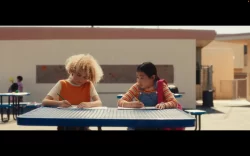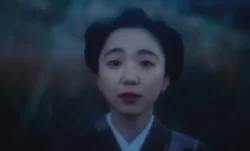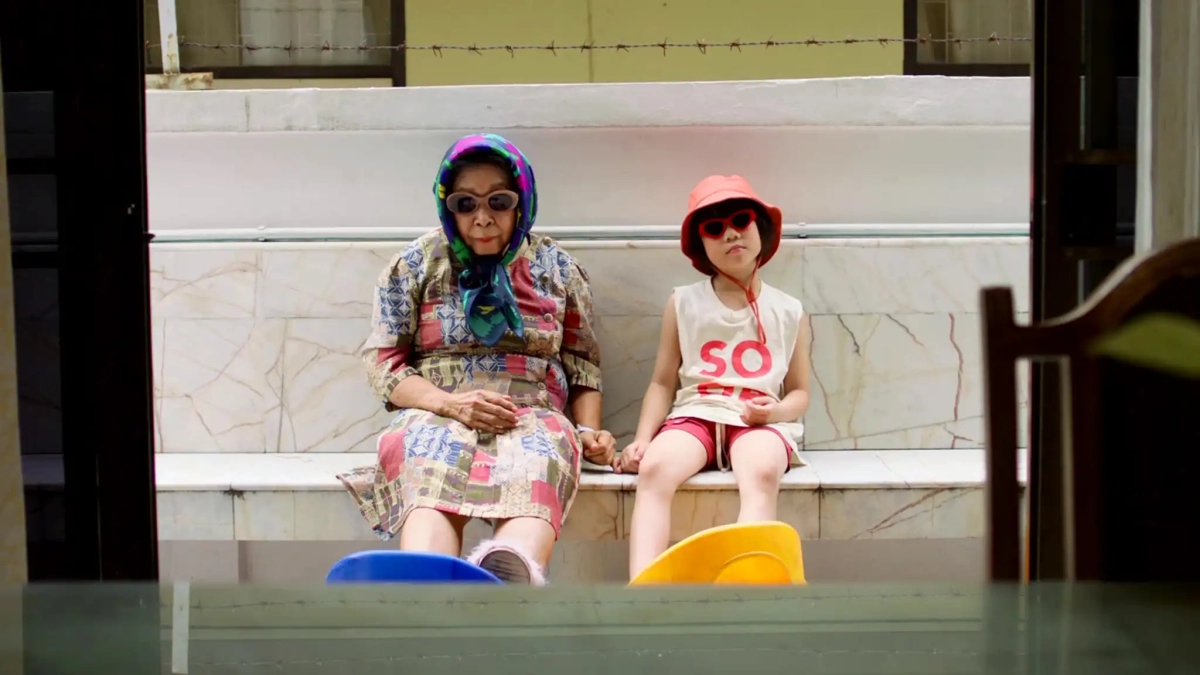The Asian American International Film Festival is now open for submissions for its 47th annual run in August 2024!
We already covered some of the gems we showed at our film festival in 2023. Here are some more from that year, to get a glimpse of the kind of programming we show.
ALL I EVER WANTED
Watched by: Leezum Regensburg
“All I Ever Wanted,” directed by Erin Lau and written by Van B. Nguyen, showcases the queer experience in a heteronormative society, specifically within an Asian household. Christine (Cathy Bui) is a young, hopeless romantic who loves watching romantic comedies. The story begins to unfold as Christine and her best friend, Jennifer (Maria Zhang), start off with a rom-com viewing that turns into a slow dance with one another. However, the tension gets interrupted when Christine’s parents, Mai (Elyse Dinh) and Tuan (Long Nguyen), burst through the front door.
The situation gets further complicated by the arrival of Peter (Connor McRaith) holding flowers and balloons, there to ask Christine to prom, and thus commencing a complicated love triangle.
This film captures girlhood beautifully. Even when we meet Christine and Jennifer, you can see how different they are based on how they dress. Their interaction is at first awkward – an all-too-familiar teenage experience that I couldn’t help but laugh at. But you can visibly see their chemistry build until they begin to dance with each other.
The small details carry this film – be it in their acting or small gestures and props, such as a shot where the audience can see Christine and Jennifer’s friendship bracelets. It’s the story of two people who realize their feelings for one another, and you can feel every emotion that they subtly portray.
This short film is such a beautiful film that shows a change in attitude towards Asian American queer representation. With strong female leads with prominent personalities, and on top of that, they get a happy ending, as opposed to a sad one. Particularly, this film showcases Asian American queer women getting that happy ending and sitting in solitude with one another. Which is different from what many queer films usually get. This film is proof that things are changing.
YOUNG PEOPLE, OLD PEOPLE & NOTHING IN BETWEEN (วายป็อบ)
Watched by: Donna Mae Foronda
“Young People, Old People & Nothing in Between” is a heartfelt dramedy by Director Parida Tantiwasadakran. Set in Thailand, the story centers around seven-year-old Juice (Deedee Piamwiriyaku) and her mission to help her grandmother, Lovely (Suwinya Kungsadan), retain as many memories as possible despite her early onset dementia.
As the narrative unfolds, we witness the inevitable toll of dementia on Lovely’s memories, allowing the film to delve into the complexities of human nature and the acceptance of life’s impermanence.
One of the film’s greatest strengths lies in the exceptional performances from both the young and older cast members, their portrayals so genuine that the characters feel like real people rather than actors on the screen. The heart and soul of the film is shared between Juice and Lovely: Juice’s dedication to her grandmother and Lovely’s struggle with dementia reflects our own experiences with time, aging, and cherished memories.
This film skillfully explores universal themes of family, love, and the bittersweet nature of memories. With a powerful narrative skillfully woven into every frame, the film evokes cathartic emotions while offering solace and connection to its viewers. Tantiwasadakran’s poignant portrayal of intergenerational love and memory makes it a remarkable testament to the power of cinema, reminding us that to be human is a celebration unto itself.

(Image Credit: Champion)
CHAMPION (챔피언)
Watched by: Donna Mae Foronda
“Champion” is a coming-of-age drama directed by Kim J.Y. Han, a Brooklyn-based filmmaker with a passion to understand and represent the Asian diaspora. Set against the backdrop of a looming financial crisis in South Korea in 1997, the film follows nine-year-old Jimin (Erin Yoonsuh Choi), whose family seeks a better life in America while her father stays behind in Korea. Struggling to adapt in a foreign land, Jimin grapples with anger and resentment, and must find the courage to navigate the uncertainties ahead. The film beautifully portrays family complexities and celebrates the power of bonds and human resilience amidst immigrant challenges.
Kim J.Y. Han’s directorial prowess shines through in “Champion” as she expertly captures Jimin’s emotional journey, skillfully weaving themes of identity, belonging, and perseverance into the fabric of the film. Through Jimin’s eyes, the film offers a profound perspective on the challenges of immigration and the courage required to navigate a new life in a foreign land. As she embarks on her journey of self-discovery, “Champion” poignantly portrays family dynamics and the immigrant experience, leaving the audience with a powerful message of hope and appreciation for the indomitable spirit of those who embrace new beginnings.
PLAYING HOUSE
Watched by: Daniel Oliver Lee
“Playing House” is a coming-of-age short film that follows seven-year-old Shio (Jiyun Lee) after she is left to her own devices by her largely absent mother. Instructed to go play, Shio embarks on a journey to entertain herself, ultimately encountering and clashing with another young girl in a fight that causes her to confront the unfortunate realities of her world. Shio finds herself equipped only with her mother’s superficial ideology of feminine beauty, which is quickly challenged when she observes a different perspective on makeup.
Inspired by both her childhood feelings and experiences as an elementary art educator, Director Eunjin Lee found herself becoming interested in telling the stories of children’s lives. In the midst of the COVID-19 pandemic, Lee found herself watching news coverage of child abuse cases in South Korea. Contemplating the environment that caused this, Lee recounts thinking about a particular girl on the news while in bed. “Suddenly, this abstract idea came up in my mind and I got up and started to write the first draft,” Lee said.
Lee also drew upon her experience working as an art educator in her directing process, evoking a wonderful performance from her young actor who carried the emotional weight of the film. “It was really joyful to communicate with my actress, Jiyun. I gave her homework to write her journal-like diary under the two conditions,” she said. “She had to write or draw something after she read the script.”
The second condition Lee gave Jiyun was that everything in the notebook would be secret; every emotion and thought shared was only between actor and director. “This whole feeling is between us, director and actress. I still have that little notebook with me in Korea.”
By connecting her experiences and knowledge from working with children in artistic spaces to her filmmaking process, Lee examines the socio-political forces that shape the people we are.

(Image Credit: The Mess We’re In)
THE MESS WE’RE IN
Watched by: Leezum Regensburg
Mother-and-daughter relationships are interwoven into the lives of many women, and may influence the way we walk our paths. These relationships shape the way we lead our lives, as we have someone who has taught us the ways to walk the path we choose to create. Sometimes, those paths can be paved in the wrong direction, and negatively impact everyone who walks it. “The Mess We’re In,” directed and written by Jamie Lam, depicts that mother and-daughter relationship within an Asian American household. The main character Dara (Ashley Kobayashi), picks up her friend Liz (Jackie Wong), from the airport. They talk about the idea of moving in together, and while Liz thinks it would be a good idea for Dara to move in with her in Toronto, Dara is afraid to take that leap.
As Dara enters her house, it’s apparent that the house is messy, and while she is moving some things around, her mother, May (Jenny Zhou) enters the house and complains about what Dara is doing. As Dara continues to clean, finding more things such as plastic bags under the sink, she comes across an Interior Design Magazine with a photo of a living room that looks perfect and clean. The process of cleaning sets off a chain of events where Dara goes back and forth on her decision to move out. Dara ultimately goes through a coming-of-age moment, where she learns how much of an impact her mother has on her regarding her life and her decisions.
The film is cleverly written, using props as a symbol with a deeper meaning. Plastic bags being under the sink is a very common thing within Immigrant households, which many from similar backgrounds may connect to. The conversation between Dara and May about the plastic bags would also sound familiar to those same audiences, particularly when May says, “What will I use for trash bags?” Dara even slips on it not once, but twice, showcasing how being in that environment was hurting her not just emotionally but also physically. May, however, both helps and hinders Dara throughout the process, showcasing how mothers can hurt you but also heal you.
Overall, this film hits quite close to home for many. This short film did a beautiful job showcasing the real and raw balances of a mother-daughter relationship. The way the characters arc was written was really progressive throughout the film, you can see how the characters grow and regress within time and experiences. I would absolutely watch this again.

(Image Credit: Silk and Rushes)
SILK AND RUSHES
Watched by: Leezum Regensburg
“There’s something about this place that makes it special” is what is said in “Silk and Rushes,” a short film directed by Ryushi Lindsay. Nothing could have been more true about the setting in which this film takes place. The owner of an inn in Japan during the Autumn of 1973 does her best to navigate her undeniable attraction towards a guest who does not take no for an answer. This guest consistently asks to stay at the inn, and tries his very best to persuade the owner of the inn to let him and his friends stay. Once the inn owner, Fuyuko, played by Sakiko Kato, finds out her husband is asleep, she runs into the inn on her own. There, she runs into a new guest, whose name is Ken Keita Arai. He proceeds to boast about the inn’s rave reviews and location. When Fuyuko sees his gangster tattoo on his chest, however, she immediately brings up every excuse in the book to refuse him service. Once Ken gets the message, she prepares him some tea as an apology before he leaves. She sits across the table from him while he drinks his tea and they have a long conversation covering a multitude of topics.
This sit-down scene over tea is the first time in the film where the characters are not arguing or bickering. They start to understand one another and see things from the other’s perspective.This candid conversation quickly reveals each person’s inner turmoils and how society motivates their decisions — whether they are ultimately happier in their circumstances or not.
This film’s color palette would be more of a cooler toned palette. With colors like blue, purple, green, and hints of amber it makes this film breathtakingly beautiful. With the film being shot on Kodak Kodachrome you can really see everything pop. The visual storytelling carefully places the two characters at odds with each other: You can see Fuyuko looking down physically at Ken when they first meet, while Ken is looking up towards Fuyuko. That power dynamic is established through visual storytelling alone. It’s the story of an unlikely friendship, and we get a front-row seat to watching it blossom.

(Image Credit: Know You Twice)
KNOW YOU TWICE
Watched by: Leezum Regensburg
Have you ever done crazy things for love, while sacrificing all that you can to make it work? “Know You Twice,” written and directed by Andrew Chan Gladstone, tells the story of a young teenage couple, Paloma (Yadira Guevara-Prip) and Claire (Zoe Cipres) struck with a harsh reality: Paloma is dealing with the possibility of being deported. Claire tries to leverage her resources to help Paloma, but when that does not pan out, Paloma thinks of another idea – asking her cousin for a wedding ring.
When Paloma proposes the idea of marriage, Claire is at a loss of words. They decide to take a trip to Cape Cod together to discuss and ponder their futures. The theme of young love comes up in this film, as two young woman are in love. Due to the immigration status of Paloma, that automatically puts her at a point where she needs to choose what to do next, ultimately at a disadvantage compared to someone who is a citizen. That is something that people can relate to. With the social aspect of this film, it talks about classism. You can see between both the main characters that their ways of living are different. For example, their clothing is different.
Overall, this film was breathtaking and the shots were stunning. Paloma’s fun yet hardworking character paired well with Claire’s level-headedness, and the jokes sprinkled throughout the film gave it a humorous flavor. The New York City setting felt authentic with the inclusion of local lingo and slang. These elements were a perfect backdrop to watching a beautiful, queer relationship unfold on screen. To see queer relationships in film is something that is so beautiful, and to see both Paloma and Claire who are both women of color in a relationship and that representation is so lovely to see. If anyone needs a good cry, this film will make you do that.
The above films screened at the 46th Asian American International Film Festival.

